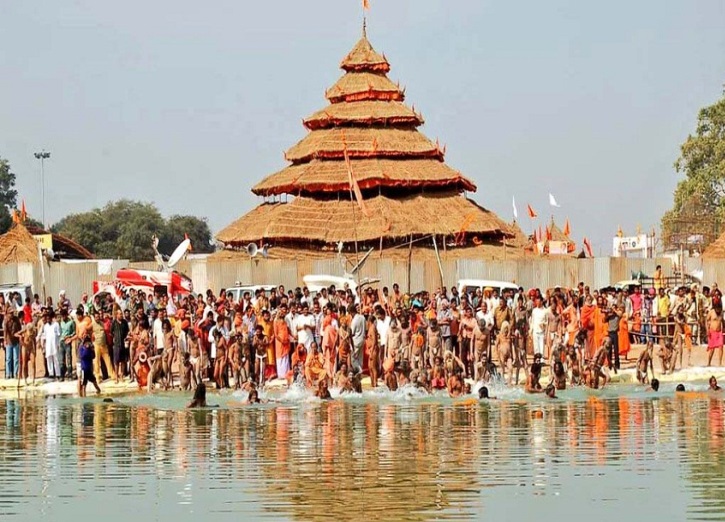


Shankaracharya Avimukteshwaranand Saraswati has demanded that the cow be declared the "National Mother," and cow slaughter be made a punishable crime. He also called for the reservation of the Kumbh Mela exclusively for Hindus, and announced plans for a grand yagna during the event. The Hindu saint also appointed representatives to oversee cow protection in each state and called on Hindus to uphold their faith and the significance of cow protection.
Cow Protection and Hindu Nationalism in India
The recent demand by Shankaracharya Avimukteshwaranand Saraswati to declare the cow as the "National Mother" and make cow slaughter a punishable crime has sparked a debate on the role of religion and nationalism in Indian society.
Origins of Cow Protection
Cow protection has long been an integral part of Hinduism, with the cow considered a sacred animal associated with the Earth Mother and the goddess Kamadhenu. The Rigveda, an ancient Hindu text, refers to the cow as "Aditi, the mother of the gods."
British Colonialism and Cow Protection
During the British colonial period, cow protection became a rallying point for Hindu nationalists. Cow slaughter was prohibited in several princely states, and the Indian National Congress incorporated cow protection into its platform.
Post-Independence India
After India's independence in 1947, cow protection continued to be a contentious issue. The Indian constitution prohibits the slaughter of milch and draught cattle, but several states have passed laws banning cow slaughter altogether.
Rise of Hindu Nationalism
In recent years, cow protection has become a key plank of Hindu nationalist ideology. Organizations such as the Rashtriya Swayamsevak Sangh (RSS) have campaigned for stricter laws against cow slaughter and the promotion of cow-based products.
Current Developments
Saraswati's demand for a National Cow Protection Law and the reservation of the Kumbh Mela for Hindus are part of a broader effort by Hindu nationalists to reclaim India's Hindu heritage. These demands have been met with both support and opposition, reflecting the complex relationship between religion, nationalism, and secularism in Indian society.
Top 5 FAQs
1. Why is cow protection important to Hindus? Cow protection is part of Hindu religious beliefs and is associated with the Earth Mother and the goddess Kamadhenu.
2. What is the current law on cow slaughter in India? The Indian constitution prohibits the slaughter of milch and draught cattle, but several states have passed laws banning cow slaughter altogether.
3. What is the role of the RSS in cow protection? The RSS is a Hindu nationalist organization that has campaigned for stricter laws against cow slaughter and the promotion of cow-based products.
4. What is the Kumbh Mela and why is it important? The Kumbh Mela is a Hindu pilgrimage that occurs every 12 years. It is one of the largest religious gatherings in the world.
5. What is the significance of Saraswati's recent demands? Saraswati's demands reflect the growing influence of Hindu nationalism in India and the attempt to reclaim India's Hindu heritage.

On his 75th birthday, Prime Minister Narendra Modi received warm wishes and praise from President Droupadi Murmu and leaders across party lines. Murmu praised Modi for instilling a culture of achieving great goals in the country and wished for his ongoing good health and leadership. Other leaders, like Yogi Adityanath and Nitish Kumar, also thanked Modi for his contributions to India's progress and development. Delhi Chief Minister Rekha Gupta and her cabinet colleagues also participated in a blood donation camp organized as part of the BJP-led city government's 'Sewa Pakhwada' to commemorate the PM's birthday.

Union Parliamentary Affairs Minister Kiren Rijiju announced the government's plans to bring an impeachment motion against Allahabad High Court Judge Justice Yashwant Varma, who is embroiled in a corruption case and has been indicted by a Supreme Court-appointed committee. Rijiju emphasized the need for all political parties to work together in this endeavor, stating that corruption in the judiciary should not be viewed through a political lens. He has already reached out to major parties and plans to engage with smaller parties before the Monsoon session of Parliament begins on July 21.

The Supreme Court rejected a petition seeking restoration of a damaged Lord Vishnu idol in Khajuraho, stating that it falls under the jurisdiction of the Archaeological Survey of India (ASI). The petitioner claimed that the idol was damaged during Mughal invasions and that the refusal to restore it violated devotees’ fundamental right to worship. However, the Court pointed out that the issue falls under ASI's purview and suggested the petitioner to worship the Shiva linga at the temple instead.

As Prime Minister Narendra Modi celebrates his 75th birthday, world leaders, including US President Donald Trump and Russian Ambassador to India Denis Alipov, congratulate him for his leadership on global cooperation and sustainable development. PM Modi will also launch health and service-oriented campaigns in Madhya Pradesh today to empower women and children. Meanwhile, Defence Minister Rajnath Singh praises Modi for his vision, dedication, and efforts towards strengthening India.

On Engineers' Day, Prime Minister Narendra Modi honored the legacy of Bharat Ratna Sir M. Visvesvaraya, a pioneering figure in India's engineering history. In a message on this occasion, the Prime Minister expressed gratitude and admiration for Sir M. Visvesvaraya's groundbreaking contributions that laid the foundation for India's modern engineering landscape. He also applauded the current generation of engineers for their creativity and determination in continuing to drive innovation and tackle challenges, highlighting their crucial role in building a developed India.

Prime Minister Narendra Modi's visit to Manipur, his first since the outbreak of violence in 2023, aims to bring peace and progress to the state. He inaugurated various developmental projects and assured support from the government for ensuring peace and stability in the state. However, the Congress has criticized the visit, calling it "shockingly insensitive." PM Modi also emphasized the strong bond between India and Nepal.

Sanjay Raut, a leader of the Shiv Sena party, has called for a boycott of the upcoming India-Pakistan cricket match in Dubai, citing it as an insult to the victims of the Pahalgam terrorist attack. He also accused Indian cricket board chief Jay Shah, son of Union Home Minister Amit Shah, of forcing the Indian team to play in the match despite their reluctance. Meanwhile, Sena workers have staged protests and even broken a TV set to show their disapproval of the match.

Veteran ABC journalist Barrie Cassidy falls for fake news about Charlie Kirk's alleged killer, falsely accusing the suspect as a right-wing extremist. However, it was later revealed that the killer was actually influenced by left-wing ideology, causing Cassidy to issue a public apology for his mistake.

Union Home Minister Amit Shah emphasized the importance of Hindi as a "friend" rather than a competitor to other regional languages during his keynote address at the Hindi Diwas 2025 and Rajbhasha Conference. Shah traced the roots of Hindi's acceptance in Gujarat and highlighted how it has coexisted with Gujarati, providing children with a wider reach at the national level. This fifth edition of the conference held outside Delhi showcases the government's efforts to strengthen communication between Hindi and regional languages.

After the outbreak of ethnic conflict in Manipur in May 2023, Prime Minister Narendra Modi made his first visit to the state and addressed separate gatherings in Churachandpur and Imphal. In his speeches, he emphasized peace as a precondition for progress, reconciliation between the hills and valley, infrastructure, and welfare. He also announced a special package and funds for rehabilitation of over 60,000 people displaced by the conflict, showcasing the central government's commitment towards rebuilding lives in Manipur. With this visit, Modi aimed to ease tensions and promote unity in the polarized state, urging for collective will in bringing back normalcy and fostering development.